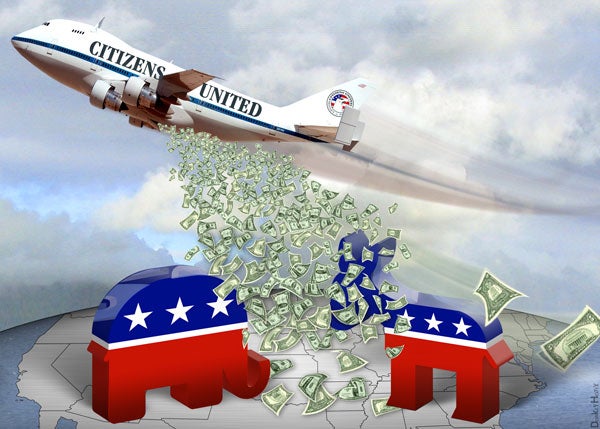|
May 21, 2012
Stanford scholars examine big money's influence on elections
Political scientists, Washington insiders and campaign watchdogs gathered at a conference to talk about the corrosive effect of money on politics and whether the economy can predict who will be president. By Brooke Donald

The 2010 Supreme Court decision, Citizens United v. the Federal Elections Commission, gave rise to the "super" political action committees. (Illustration: DonkeyHotey / Creative Commons) The U.S. Supreme Court ruling in Citizens United resulted in an unprecedented wave of independent – and strikingly negative – political advertising.
This new money funded through super PACs was a main topic of discussion among leading political scientists and economists at a recent Stanford conference.
"In normal campaigns, which is to say where candidates are spending the money, they tend to have a balance between positive and negative ads," said Trevor Potter, a former commissioner at the Federal Elections Commission and lawyer for the Super PAC set up by comedian Stephen Colbert.
Now, Potter said, "You have new money in the system that wasn't there before in large sums running totally negative ads, and the candidate can't do anything about it legally."
The 2010 Supreme Court decision, Citizens United v. the Federal Elections Commission, gave rise to the "super" political action committees.
The case and subsequent court rulings resulted in a flood of unlimited donations to political action committees from wealthy donors, corporations and labor unions. The money from these donations can only be spent independent of the candidate.
Potter said the Citizens United decision reflected a lack of understanding of the political system among the justices, none of whom have held elective office.
"It was decided by a court that's lost touch with, has not had touch with, how politics actually work and how campaigns actually work," he said.
The daylong conference hosted by the Stanford Institute for Economic Policy Research (SIEPR) asked the question, "Is it government by the people, or the best government money can buy?"
Does big money influence outcomes or shape a candidate's message? And what about corruption – can a hefty infusion of cash influence policy? Political scientists, economists, campaign watchdogs and others joined to discuss the role of money in the presidential election.
Those who took to the stage included Stanford Professors Bruce Owen, Adam Bonica and David Brady, as well as colleagues from UCLA and Vanderbilt, and Washington insiders, media experts and campaign advisers.
"I don't think this is a partisan issue," said Joel Hyatt, co-founder and CEO of Current TV and the national finance chairman for Al Gore's 2000 presidential campaign. "I think it is totally corrupting our system of government."
The independent cash-raising organizations, or Super PACs (political action committees), were the target of much ire.
The issue of whether the new allowances for independent spending corrupt the political system was tackled throughout the event, as was whether bad politics can corrupt the economy.
Brady, a senior fellow at the Hoover Institution, SIEPR and the Freeman Spogli Institute, and Lynn Vavreck of UCLA dissected how experts use fiscal data to predict winners and losers in the presidential race.
Looking at economic indicators including gross domestic product and unemployment figures, Vavreck said, experts can reasonably predict election outcomes with a 75 percent accuracy rate.
"You can do 50 percent with the flip of a coin, so that extra little bit, I'll take that. It's pretty good," Vavreck said.
Generally, the incumbent is favored if there is economic growth – so if you believe that model, President Barack Obama wins if the economy continues its upward path. Logically then, an opponent of the incumbent is favored when growth stalls – Mitt Romney is next in the White House if the economy weakens or levels off.
But just because elections can be predicted fairly well based on economic data doesn't mean that the money spent and campaign messages crafted aren't relevant, Vavreck added. There is, after all, the 25 percent of the time that the model fails.
"This is going to be a close election," Brady said. "And this is an election in which the campaign and the candidates and the message are going to matter."
Brady highlighted Obama's approval rating – less than 50 percent. Historically, candidates lose if they go into an election with under 50 percent approval.
He also pointed to poll numbers showing more independents rallying behind Romney when it comes to the economy and job creation. The independents go to Obama, however, when asked about who would be better at protecting the middle class.
"So these poll results are clearly going to drive the messages of the campaigns," he said.
Brady concluded with a prediction that Obama would be re-elected, with the caveat that anything can change over the next several months.
"Whenever you give these talks," he said, "people want to know who is going to win."
-30-
|